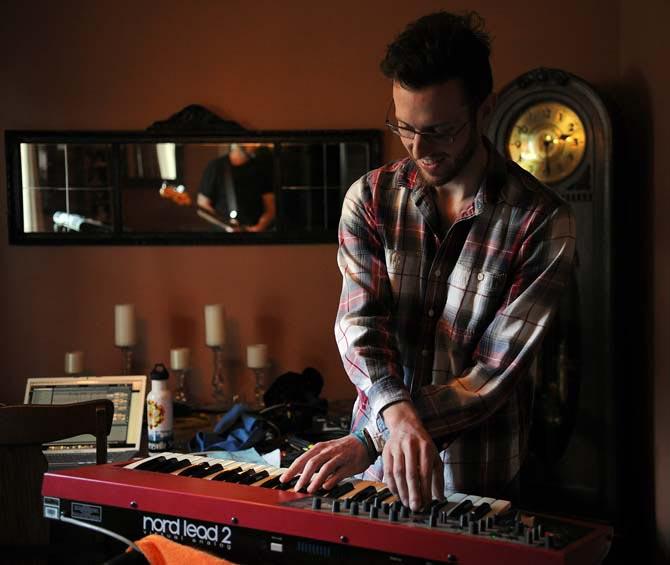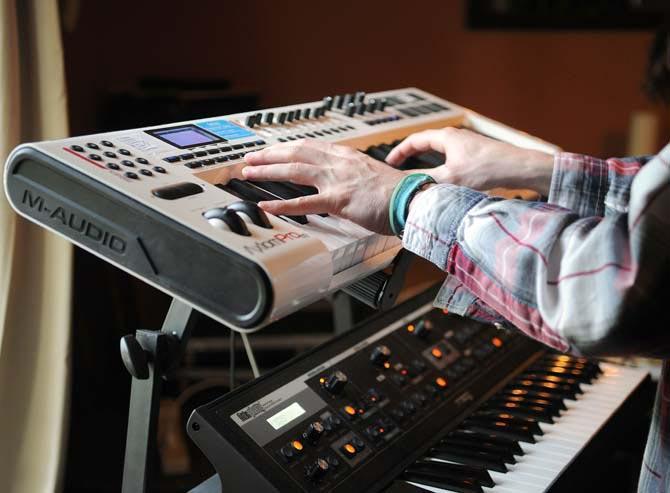“The underlying current has changed.”
Dan Callaway succinctly summed up just how much local band England in 1819 has changed in the past few months.
Composed of Dan and his brother Andrew, the band has been featured in Paste Magazine and has toured throughout the country. The England in 1819 of old was enormous, in sound and size. The group originally had nine members, including the Callaways’ father, and the band’s shows used to be a grand event, which, Dan Callaway said, was more suited for an art gallery than a venue. But with the burden of touring for long months, members continually left until the band was back to its original skeleton — the Callaway brothers.
The difference between England in 1819’s new sound and its old is huge — the band went from having slow, desperate melodies accompanied by synthesizers to having a massive synth sound with vocal accompaniment. But the band doesn’t see it that way. Instead, the Callaway brothers see the transition as fluid change. And more importantly, the new sound is more suited for two people to physically make.
Both classically trained, Dan in French horn and Andrew in composing, the Callaways try their best to incorporate as many instruments as possible, but the feat is difficult for two people.
But as far as inspiration goes, England in 1819 can find it anywhere.
The Callaways spent the past summer in Asheville, N.C. — they’d originally planned to record there, but after spending some time, they came across a factory that manufactures “Moogs,” or vintage synthesizers. After becoming acquainted with the instrument, they decided to utilize it in the making of their new sound. The brothers secluded themselves to a cabin to write and record, allowing them to work on their third album, “Fireball Electric Tomorrow.”
With this album, it seems as if the brothers have truly gotten to the root of who they really are as both musicians and people. Dan lends his hand by playing the French horn, among other instruments, and Andrew still performs vocals, but they’re much different than before, with a seemingly emotional quality. Even the album artwork beckons to where the Callaways came from, with a childhood picture accompanied by an English backdrop.
“We grew up in England,” Callaway said.
But England isn’t the only place the Callaways call home. The pair went to high school in Baltimore, have friends in Montreal and only live in Baton Rouge when they’re not on the road. England in 1819’s travels can be heard in its music as well — there’s a certain Canadian indie quality to it that is displayed by bands like Stars and Final Fantasy, not to mention Arcade Fire.
“We were kind of like a depressed Arcade Fire, and now we’re an upbeat Beach House,” Callaway said.
Even though many in the Baton Rouge scene can vouch for England in 1819’s place in local music, the Callaways are more humble.
“We don’t play a style that is represented much, and we don’t think we’re going to take over Louisiana or anything,” Callaway said.
The band always starts and ends its tours in Baton Rouge — these are the shows that commonly have the best turnout.
“We still kind of do everything ourselves, figuring out how to write and tour, the business and organization aspect, the logistics,” Callaway said.
Those logistics include a light show to accompany England in 1819’s music, something that the band brought back from their larger days. The band sees its live show as an integral part of the England in 1819 name, and the Callaways work hard to cultivate an experience for fans.
England in 1819 will begin its fall tour at The Spanish Moon on Sept. 27. Their latest album, “Fireball Electric Tomorrow,” is available for download on Bandcamp beginning Sept. 24.
“We were kind of like a depressed Arcade Fire, and now we’re an upbeat Beach House.”
England in 1819: Latest album showcases band’s new sound
September 23, 2013
Andrew Callaway, one half of England in 1819, plays synthesizer at their practice space Monday, Sept. 16, 2013 as the band rehearses for their upcoming tour.






